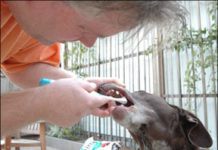Shock Wave Therapy For Dogs With Arthritis
but after only one eSWT treatment
Canine Sports and Proper Canine Injury Prevention Through Conditioning
Today's explosion of canine sports has made sports medicine a veterinary specialty. But, says Carol Helfer, DVM, at Canine Peak Performance Sports Medicine & Physical Rehabilitation Center in Portland, Oregon, competing dogs are prone to injury not because their sports are inherently dangerous but because canine athletes seldom receive the conditioning training that keeps them strong, balanced, and coordinated. The whole notion of injury prevention through proper conditioning is one that is just beginning to gather attention,h explains Dr. Helfer. What I love about this work is that a few simple exercises can dramatically change a dog's quality of life. In athletic dogs, the proof is in their continued good health, enhanced performance, and absence of injuries. Elderly and sedentary dogs benefit, too, and they quickly show increased range of motion and a renewed enthusiasm for activities."
Frequently Used Canine Healing Methods for Injured Dogs
We call it the spark of life for good reason. From birth to death, all living creatures generate and transmit energy. Entire healing therapies, some of them thousands of years old, have been built around energy. Once dismissed by Western science as impossible or ridiculous – and still viewed with suspicion by conventional physicians and veterinarians – energy medicine is slowly gaining acceptance in the United States. Several energy therapies are taught in American universities or are used by a growing number of healthcare practitioners. Can energy therapies help your dog? The descriptions and resources provided here may help you decide.
Bee Products Have a Special Meaning for Dogs
Bees may sting, but they create some of the world's most valuable, versatile products. Honey, bee pollen, royal jelly, beeswax, propolis, and even the venom from bee stings are all touted for their human health benefits and many experts say that dogs derive the same advantages.
Canine Lipomas
Lumps, bumps, fatty tumors – call them what you will, but nobody likes to see her dog develop lipomas, those persistent little foothills that can sprout up on older dogs – and sometimes, not so-old ones. Often soft and squishy to the touch, benign fatty tumors are not a threat to your dog’s health. (The exception is infiltrative lipomas, which can invade muscle tissue, but these are relatively rare.) While lipomas can be unsightly, many vets opt not to remove them unless they are in a location where their growth impedes a dog’s mobility. But many holistic veterinarians see lipomas as far from innocuous. Instead, they stress, lipomas are symptoms of a bigger problem.
Whole Dog Journal’s Guide to Canine Health Books
Having a solid library of canine literature, or at least a shelf or two full of good books, is a great hedge against making uninformed decisions about your dog’s health. Of course, a trip to your veterinarian is your first line of defense when something is obviously wrong with your dog. I’ve seen complementary and alternative approaches succeed where conventional medicine has failed too many times to throw the puppy out with the bathwater. The books highlighted here take a truly holistic, inclusive approach to healthcare.
Canine Cancer Therapy Update
Despite everything modern medicine has to offer, cancer in dogs remains among the most feared of canine diseases. Just over a year ago, Whole Dog Journal reviewed conventional, complementary, and alternative cancer therapies in a series of articles. Since then, a cancer vaccine has been approved for veterinary use and a new version of an old herbal salve has become a “first choice” for many holistic veterinarians.
Canine Allergies and Your Dog’s Health
or anything else.üBonnie's sores healed when her owner noticed her eating fresh cleavers, and started giving the dog supplemental forms of the herb.
Canine Dental Care
Some dogs have sparkling white teeth (or at least, whitish teeth that are free of tartar) throughout their lifetimes, with absolutely no thought or effort required of their owners. Those are the lucky ones – the owners, I mean – because more than 80 percent of dogs develop a form of canine gum disease by the age of just three years, according to the American Veterinary Dental Society. The owners of those dogs – that is, most of us – should be brushing our dogs’ teeth regularly to prevent the accumulation of plaque and tartar that precipitates gum disease. Proponents of raw dog food diets believe that the mechanical action of chewing raw meat and bones and the superior nutrition provided by the diets help maintain healthy teeth. That may be true, but for dogs on more conventional diets, regular brushing is the most effective method of keeping a dog’s teeth free of tartar and plaque.
Dog Exercises and Injury Prevention
Strained muscles, pulled ligaments, sprains, and bruises . . . these are common canine injuries in the spring, when the weather invites us all outside and even seems to encourage our dogs to overdo it. Enthusiastic, rigorous exercise that follows several months of relative inactivity is a prescription for injury.


















